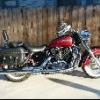-
Welcome to the eG Forums, a service of the eGullet Society for Culinary Arts & Letters. The Society is a 501(c)3 not-for-profit organization dedicated to the advancement of the culinary arts. These advertising-free forums are provided free of charge through donations from Society members. Anyone may read the forums, but to post you must create a free account.
Basting Poultry -- Does it do anything?
-
Similar Content
-
- 13 replies
- 5,027 views
-
On Raising One's Own Meat (and Poultry for Eggs), With Some Discussion of the Attendant Pleasures and Dilemmas 1 2 3 4 6
By chromedome,
- 131 replies
- 34,893 views
-
- 3 replies
- 439 views
-
- 7 replies
- 3,010 views
-
- 1 reply
- 1,453 views
-
-
Recently Browsing 0 members
- No registered users viewing this page.






Recommended Posts